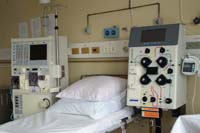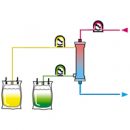For most patients suffering from chronic renal failure, hemodialysis is the only way to purify blood. Apparatus «Artificial kidney» Connects to the patient's circulatory system, partially replacing the kidney function.
Content
Constantly, 24 hours a day, blood is cleaned by the kidneys from harmful compounds accumulating in the human body in the process of metabolism. In the kidneys they do nephrons, microscopic «Claiming facilities» which filtered blood, delay and remove hazardous substances with urine, save the necessary compound organism. A healthy person in each kidney has about 1.2 million such nephrons. Working together, they produce about 1.5-2.0 liters of urine per day. In addition, healthy kidneys regulate blood pressure, produce a hormone, stimulating the production of red blood cells, produce active forms of vitamins that strengthen bones. Nephronos are very subtle and accurate devices and deaths of them as a result of the disease is an irreparable loss - the dead nephrons never already restore their work.
Chronic renal failure - testimony for hemodialysis
 Unfortunately, in some diseases, nephrons fail one by one and their amount in the kidneys decreases. The remaining nephrons work with high load and die faster. This process can go for years, and maybe quickly, for several months he strongly reduce the number of operating nephrons. Often it proceeds completely unnoticed for the patient. Sometimes, as long as the number of nephrons has not decreased to 5% of the norm, a person does not feel sick. This is due to the fact that working nephrons can long perform the work of the dead.
Unfortunately, in some diseases, nephrons fail one by one and their amount in the kidneys decreases. The remaining nephrons work with high load and die faster. This process can go for years, and maybe quickly, for several months he strongly reduce the number of operating nephrons. Often it proceeds completely unnoticed for the patient. Sometimes, as long as the number of nephrons has not decreased to 5% of the norm, a person does not feel sick. This is due to the fact that working nephrons can long perform the work of the dead.
However, such work with overload can not continue long and the patient comes poisoning with harmful metabolic products, substances that in a healthy person are constantly removed from the body with urine. This condition is called chronic renal failure. In chronic renal failure, the patient feels weakness, gradually loses the ability to physical and mental work, sometimes heavily loses weight or, on the contrary, gaining weight due to increasing edema, often loses appetite, it feels nauseous, urge to vomiting. In future cases, the patient may be drowshed, it may lose consciousness, in the excess of water in the body may develop swelling of the lungs.
Treatment of chronic renal failure consists of attempts to extend the fading work of the remaining nephrons using the treatment of the underlying disease, a strict diet, salt limitations, a decrease in high blood pressure. Such treatment does not make it possible to restore the normal work of the kidneys, it is impossible in chronic renal failure, with successful use, such treatment only allows you to extend the gradual and steadily deteriorating kidney function. Before such a state did not exist and the diagnosis of chronic renal failure was absolutely fatal. However, now it is not.
Hepodialysis options
Now there are methods of treatment capable of partially or completely replace the lost kidney function:
- Hemodialysis
- Peritoneal dialysis
In general, the best quality of life is achieved after a kidney transplantation, hemodialysis and peritoneal dialysis provide approximately equal quality of life.
Hemodialysis procedure
 The process of blood purification using special filters - dialyissors is called hemodialysis. Hemodialysis is carried out using the device «Artificial kidney», which connects to the patient's circulatory system through the Vascular access created by surgeons - arterio - venous fistula. Connecting the device «Artificial kidney» occurs by fistula enclosure by special needles connecting through the tube system with a dialyzer. A small amount of patient's blood is out of its body, cleaned from harmful substances, and returned to the patient's vessels already purified. Such a process lasts 4-5 hours with a frequency of 3 times a week, for years and decades, partially replaces the function of the kidneys and allow patients to live a full life and often maintain performance. All surfaces of systems in contact with blood are used only once, but there are possibilities for re-disinfection and the use of dialyissors from the same patient. Hemodialysis procedures require the use of complex equipment, especially clean water, sterile solutions, so they are conducted in special dialysis centers where experienced staff.
The process of blood purification using special filters - dialyissors is called hemodialysis. Hemodialysis is carried out using the device «Artificial kidney», which connects to the patient's circulatory system through the Vascular access created by surgeons - arterio - venous fistula. Connecting the device «Artificial kidney» occurs by fistula enclosure by special needles connecting through the tube system with a dialyzer. A small amount of patient's blood is out of its body, cleaned from harmful substances, and returned to the patient's vessels already purified. Such a process lasts 4-5 hours with a frequency of 3 times a week, for years and decades, partially replaces the function of the kidneys and allow patients to live a full life and often maintain performance. All surfaces of systems in contact with blood are used only once, but there are possibilities for re-disinfection and the use of dialyissors from the same patient. Hemodialysis procedures require the use of complex equipment, especially clean water, sterile solutions, so they are conducted in special dialysis centers where experienced staff.
Nutrition and dialysis
Compliance with a diet with a patient with chronic renal failure is extremely important for maintaining a fading renal function and is often able to significantly extend the prediatic period and help in the treatment of arterial hypertension, reduce the likelihood of edema. Patient with chronic renal failure must carefully listen to all the recommendations of his doctor, must ask all the necessary questions and discuss all the unclear problems of their food. This applies to patients with diabetes mellitus.
Full life
Patients receiving replacing kidney function are capable of conducting a full life, work, learn, educate children, are able to transfer significant physical exertion. There are cases when patients who are on dialysis have successfully engaged in sports, rose to the mountain peaks, floated with scuba, managed by aircraft. No one no longer surprise cases when women receiving dialysis turned out to be able to conceive and make a healthy child.









